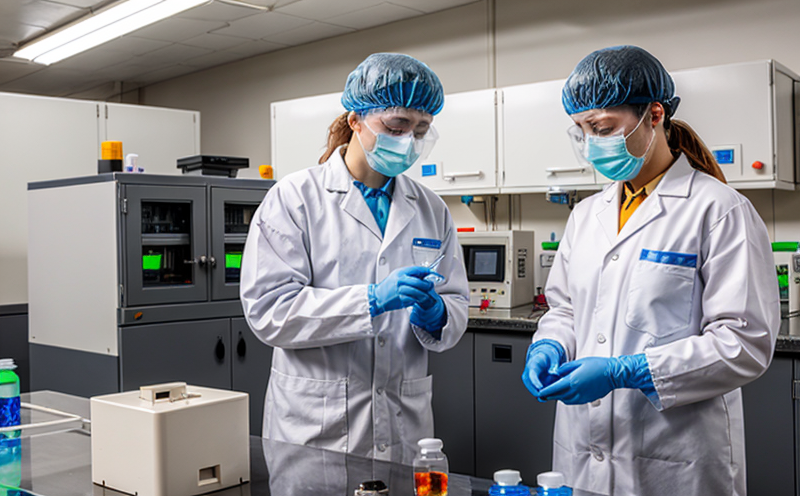EN 17036 Acrylamide Analysis in Fried Snacks
The European Standard EN 17036 provides a method for determining acrylamide content in fried and baked products. This standard is particularly important in the food & feed testing sector, as it helps ensure consumer safety by monitoring levels of this potentially harmful compound.
Acrylamide forms during high-temperature cooking processes such as frying and baking, especially when carbohydrates are present in the ingredients. High concentrations can lead to health risks, making accurate and reliable analysis crucial for food manufacturers and suppliers.
The testing method outlined in EN 17036 involves extraction of acrylamide from the sample followed by its quantification using liquid chromatography with tandem mass spectrometry (LC-MS/MS). This approach ensures precision and accuracy, which are vital for regulatory compliance and product safety.
Our laboratory adheres strictly to this standard, ensuring that every test is conducted under controlled conditions. We employ experienced technicians who understand the nuances of sample preparation and instrument operation necessary for reliable results.
The process begins with careful selection and preparation of the fried snack samples according to EN 17036 specifications. Once prepared, these samples undergo extraction techniques designed to liberate acrylamide from its bound state within the matrix. Following extraction, the target compound is analyzed using LC-MS/MS for accurate quantification.
The results generated by our laboratory are comprehensive and detailed, providing not just raw data but also interpretations that help guide decision-making processes related to product formulation and process optimization.
Our commitment to adhering strictly to EN 17036 ensures consistency across all tests conducted. This standardization is essential for maintaining high-quality standards in food production while ensuring compliance with international regulations.
We also offer additional services such as training sessions on how to correctly prepare samples and interpret results based on EN 17036 guidelines, further enhancing our clients' ability to meet regulatory requirements effectively.
Customer Impact and Satisfaction
- Regulatory Compliance: By ensuring accurate acrylamide levels in fried snacks through rigorous testing according to EN 17036, we help our customers meet stringent regulatory standards.
- Informed Decision Making: Our detailed reports provide insights into the quality of their products, enabling informed decisions regarding formulation and processing improvements.
Our clients appreciate the transparent communication and support provided throughout the testing process. They also benefit from our expertise in interpreting results and offering practical recommendations for product improvement based on these analyses.
The peace of mind that comes with knowing your products comply with international standards is invaluable to our customers, who rely on us to deliver accurate and reliable data consistently.
International Acceptance and Recognition
- ISO/IEC 17025: Our laboratory meets the highest international standards for quality management systems, ensuring reliability in our testing processes.
- Global Client Base: We serve companies across various countries, all of whom trust us to provide accurate and consistent results.
The EN 17036 standard is widely recognized globally due to its stringent requirements for detecting acrylamide in fried foods. Compliance with this standard enhances the reputation of our clients' brands internationally by assuring consumers about product safety.
Our commitment to maintaining rigorous testing protocols aligns us with international best practices, making our services attractive not only domestically but also internationally.
Environmental and Sustainability Contributions
The analysis of acrylamide in fried snacks contributes positively towards environmental sustainability by promoting safer food processing methods. By identifying potential hazards early on, manufacturers can adjust their processes to reduce acrylamide formation without compromising taste or texture.
This proactive approach supports broader sustainability goals by contributing to healthier diets and reducing unnecessary waste resulting from recalls due to unsafe products. Our services thus play a crucial role in fostering sustainable practices within the food industry.





